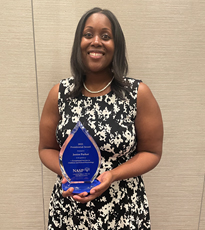Janise Parker receives national awards for her work in school psychology

Janise Parker, assistant professor, was recently awarded both the Presidential Award for Exceptional Service to Children in School Psychology and the Faculty Champion Award by the National Association of School Psychologists (NASP).
As an early career faculty member, Parker has already made significant contributions to the field of school psychology. Sitting on the Early Career Committee for NASP, she realized that there were no structured programs in place for marginalized school psychologists who may encounter issues without support, which could lead to burnout. Parker investigated the literature suggesting how to retain school psychologists and efforts to make mentorship more concrete and tangible. Then, she developed a structured program for women of color who are early career practitioners in school mental health fields. She built modules, lessons, and activities based on the research about tools to help navigate workplace discrimination and supportive self-care.
“I was aware of the shortage of school psychologists and wanted to be a part of the solution. I was inspired to create a structured program to support retention and wellness. I wanted it to be evidence based and available” shares Parker. Her personal experiences as an early career faculty member and a woman of color also aligned with what she was observing as a member on the NASP Committee. Parker reflects, “As an early career woman of color, it has not always been easy in the academy. I did experience discrimination, and I did not have the tools to navigate it, because it’s not something we are taught during our graduate studies. So, I felt inspired, which led me to a call to action to figure out how to give people the tools and resources, so others do not become stuck like I did.”
Following a pilot test of the program, participants shared many benefits to their participation. Parker comments, “We piloted this program, and the women said it allowed them to view themselves more powerfully, helped them internalize their self-worth and what they can bring to the field, and they developed a sisterhood.” Parker also hoped this program would dismantle the idea of imposter syndrome rather than continue the narrative of simply learning to cope with it. The program was a huge success and participants asked Parker if other women in education and mental health fields could join the program during future iterations as well.
Another of Parker’s significant contributions to the field is her work in religion and spirituality, exploring how school psychologists can consult with families and students when religion is brought into the conversation. This work was influenced by Parker’s personal experience as a school psychologist, not knowing how to navigate spaces when students or families brought up religion in the school setting. She shares, “As a school-based mental health provider, I did not know what to do. Religion and spirituality are part of my core identity, so I know it matters, but it is not systemically highlighted in the professional literature. It is an understudied topic in the field and in education. They are important aspects of diversity.” Knowing there was a gap in the research, Parker shares, “I pushed the boundaries to see how we could support kids.” Specifically, Parker has examined how school psychologists and other mental health providers can respond to the strengths and struggles of Black youth in relation to religion and spirituality. Parker remembers facing significant backlash for pursuing this topic, often receiving messages noting that she would never get published in academic journals. But Parker was persistent, and she became the first recognized researcher at the national convention for her work in this area, and she has been invited to write book chapters on the topic. She has served as a guest lecturer across the country and meets with school psychology students from various universities who share how her work has inspired them to pursue this same area of scholarship. Because of her persistence and groundbreaking work in the field of school psychology, she received the Presidential Award for Exceptional Service to Children in School Psychology.
Parker has also been recognized for her efforts in building the success of others with the NASP Faculty Champion Award. She was recently awarded for her work as a sponsor and mentor to her students at William & Mary. Parker serves as a liaison between NASP and the W&M student representative to NASP, Monique Williams. “I am always looking for opportunities to help my school psychology students to grow. I will pass along opportunities or create them. I am intentional in promoting student growth and the development of W&M students” comments Parker. For example, she has found ways to strengthen her students’ skills in telehealth and working with communities through the Success of Students (SOS) program.
Parker views these awards as a result of her courage, “I had to push through the doubts and fears. In the academy, we are often put into a box, and I went against the status quo, which was petrifying. Now I am being recognized and having success as a result.” In an academic landscape where studying religion within school psychology would be a “hard sell,” Parker found support in her endeavors at W&M. “There has been support at the university and school level to be innovative and impactful and make a difference, which confirms why I came here. And it has been a joyous experience being here” shares Parker. In fact, her work has led her to serve as a fellow with the Bray School Lab through the Office of Strategic and Cultural Partnerships, where she is leading efforts to develop a healing-centered microcourse that focuses on the intersection of race/racism, religion/spirituality, policy/practice, and action/activism.
Parker continues to flourish at W&M developing programs and building opportunities for others. Both the Presidential Award for Exceptional Service to Children in School Psychology and the NASP Faculty Champion Award reflect Parker’s courage and commitment to serve her students, school psychologists, faculty, and her community.